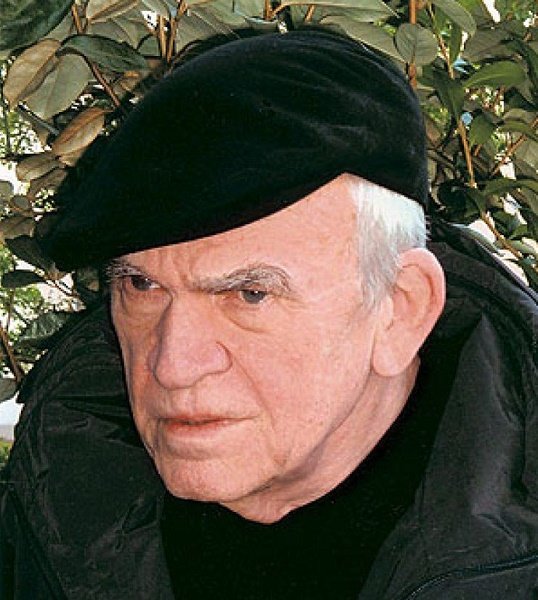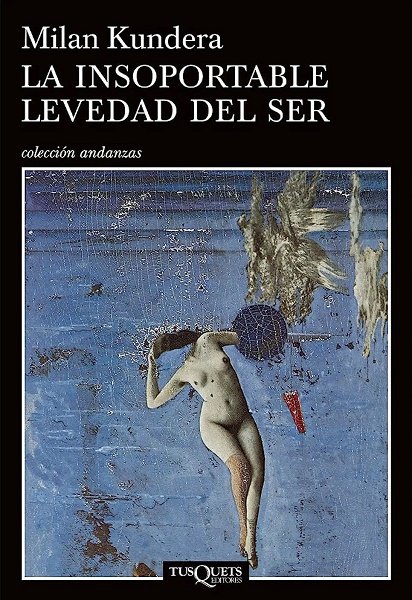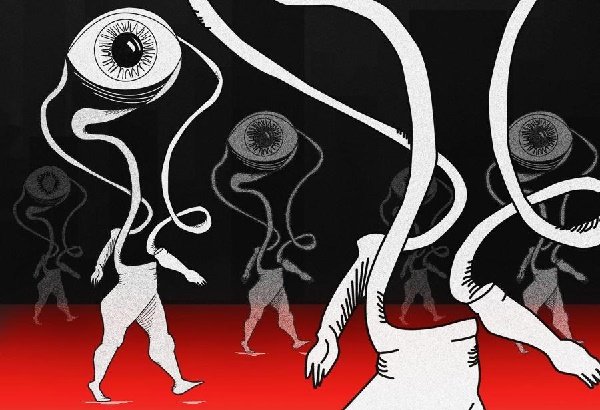Milan Kundera o de la inevitable carga del vivir | Milan Kundera or the inevitable burden of living
Ayer, 11 de julio, falleció uno de los más importantes novelistas de los últimos 50 años, Milan Kundera. El escritor de origen checo murió a la edad de 94 años en Francia, país que le otorgó la nacionalidad, donde se residenció desde 1975, al rehuir el acoso por parte del régimen comunista checoslovaco.
============
Yesterday, July 11, one of the most important novelists of the last 50 years, Milan Kundera, passed away. The Czech-born writer died at the age of 94 in France, the country that granted him citizenship, where he had resided since 1975, after fleeing harassment by the Czechoslovak communist regime.

Autor de ensayos, cuentos y obras de teatro, a Kundera se le conoce sobre todo por su obra novelística compuesta de unas diez novelas. No insistiré en una caracterización de su creación literaria, pues ya lo hice hace un año en un post publicado aquí. Lamentablemente no he podido leer toda su obra publicada, por las dificultades que se le presentan a un habitante de provincia en Venezuela, a las condiciones económicas y a las limitaciones de acceso al libro sufridas por el país. Así que me detendré en unos fragmentos, con un somero comentario mío, de la última novela que pude leer de él: La insoportable levedad del ser, en 1994.
============
Author of essays, short stories and plays, Kundera is best known for his novelistic work composed of about ten novels. I will not insist on a characterization of his literary creation, as I already did it a year ago in a post published here. Unfortunately, I have not been able to read all of his published work, due to the difficulties faced by a provincial inhabitant in Venezuela, to the economic conditions and to the limitations of access to books suffered by the country. So I will stop at a few fragments, with a brief commentary of my own, from the last novel I was able to read by him: The Unbearable Lightness of Being, in 1994.

Si bien se trata de una historia de amor de dos parejas, con los componentes contradictorios propios de estas relaciones, todo está relacionado, a través de la vida de sus protagonistas, con el contexto sociohistórico y el mundo ideológico en el que se debaten, que Kundera confronta con sus aguzadas reflexiones de tono filosófico, casi como si se tratara de un ensayo. Veamos algunos ejemplos.
La idea del eterno retorno es misteriosa y con ella Nietzsche dejó perplejos a los demás filósofos: ¡pensar que alguna vez haya de repetirse todo tal como lo hemos vivido ya (…)!
(…)
Si cada uno de los instantes de nuestra vida se va a repetir infinitas veces, estamos clavados a la eternidad como Jesucristo a la cruz. La imagen es terrible. En el mundo del eterno retorno descnasa sobre cada gesto el peso de una insoportable responsabilidad. Es el momento por el cual Nietzsche llamó a la idea del eterno retorno la carga más pesada.Pero si el eterno retorno es la carga más pesada, entonces nuestras vidas pueden aparecer, sobre ese telón d fondo, en toda su maravillosa levedad.
¿Pero es de verdad terrible el peso y maravillosa la levedad?
Así nos introduce el narrador, en las primeras páginas del discurso novelístico, en el núcleo del complejo asunto que se desarrolla, sin solución (pues no la hay), a lo largo de la novela, dejando traslucir desde ya la incertidumbre frente a tal dilema.
============
Although it is a love story of two couples, with the contradictory components typical of these relationships, everything is related, through the lives of its protagonists, to the sociohistorical context and the ideological world in which they struggle, which Kundera confronts with his sharp reflections of philosophical tone, almost as if it were an essay. Let us look at some examples.
The idea of the eternal return is mysterious and with it Nietzsche left other philosophers perplexed: to think that everything will ever repeat itself as we have already experienced it (...)!
(...)
If each of the instants of our life will be repeated infinite times, we are nailed to eternity as Jesus Christ to the cross. The image is terrible. In the world of eternal return, the weight of an unbearable responsibility descends on each gesture. It is the moment for which Nietzsche called the idea of the eternal return the heaviest burden.But if the eternal return is the heaviest burden, then our lives can appear, against this backdrop, in all their marvelous lightness.
But is the weight really terrible and the lightness marvelous?
Thus the narrator introduces us, in the first pages of the novelistic discourse, to the core of the complex issue that develops, without a solution (since there is none), throughout the novel, leaving the uncertainty in the face of such a dilemma.

Al comienzo de la novela que llevaba bajo el brazo cuando llegó a casa de Tomás, Ana se encuentra con Vronsky en circunstancias extrañas. Están en un andén en el cual alguien ha caído bajo las ruedas del tren. Al final de la novela, la que se lanza bajo las ruedas del tren es Ana. Esta composición simétrica, en la que aparece el mismo motivo al comienzo y al final, puede parecer muy “novelada”. De acuerdo, pero con la condición de que la palabra “novelado” no se entienda en el sentido de “inventado”, “artificial”, “que no se parece a la vida”. Porque es precisamente así como se componen las vidas humanas.
Kundera, a través de su narrador, nos afronta con un modo de presentarse, peculiarmente, lo que se reflexiona al comienzo. ¿Cómo está compuesta la vida? ¿Linealmente, circularmente, cíclicamente? ¿Pueden encontrarse la realidad y la ficción en una relación parecida a un bucle de reversible continuidad como en una cinta de Moebius?
============
At the beginning of the novel she was carrying under her arm when she arrived at Tomas's house, Anna meets Vronsky under strange circumstances. They are on a platform where someone has fallen under the wheels of the train. At the end of the novel, the one who is thrown under the wheels of the train is Anna. This symmetrical composition, in which the same motif appears at the beginning and at the end, may seem very "novelistic". Agreed, but on condition that the word "novelized" is not understood in the sense of "invented", "artificial", "not resembling life". Because that is precisely how human lives are composed.
Kundera, through his narrator, confronts us with a way of presenting, peculiarly, what is reflected at the beginning: How is life composed? Linearly, circularly, cyclically? Can reality and fiction meet in a relationship similar to a loop of reversible continuity as in a Moebius tape?

A los que creen que los regímenes comunistas de Europa central son exclusivamente producto de seres criminales, se les escapa una cuestión esencial: los que crearon estos regímenes criminales no fueron los criminales, sino los entusiastas, convencidos de que habían descubierto el único camino que conduce al paraíso. Lo defendieron valerosamente y para ello ejecutaron a mucha gente. Más tarde se llegó a la conclusión generalizada de que no existía paraíso alguno; de modo que los entusiastas resultaron ser asesinos.
(…)
Tomás seguía atentamente esta polémica (la seguían los diez millones de habitantes de la nación checa) (…)
Y llegó a l conclusión de que la cuestión fundamental no es: ¿sabían o no sabían?, sino: ¿es inocente el hombre cuando no sabe?, ¿un idiota que ocupa el trono está libre de toda culpa sólo por ser idiota?
Aparece aquí, de otro modo, quizás más virulento, la contrariedad que atraviesa la obra toda de Kundera. Esta vez desde “el peso de una insoportable responsabilidad”, el que había anotado el narrador en su discurso inicial. Por ese momento, como otros en la novela, sólo que aquí de modo más enfático, Kundera nos “pasa” su juicio sobre el pasado reciente de Europa central y oriental, que puede repetirse (y, lamentablemente, lo sigue siendo en otros países).
============
Those who believe that the communist regimes of Central Europe are exclusively the product of criminal beings are missing an essential point: those who created these criminal regimes were not criminals, but enthusiasts, convinced that they had discovered the only road leading to paradise. They courageously defended it and for this they executed many people. Later it was generally concluded that there was no paradise at all; so the enthusiasts turned out to be murderers.
(...)
Thomas followed this controversy attentively (it was followed by the ten million inhabitants of the Czech nation) (...)
<And he came to the conclusion that the fundamental question is not: did they know or did they not know, but: is man innocent when he does not know, is an idiot who occupies the throne free from all guilt just because he is an idiot?
Here appears, in another way, perhaps more virulent, the contrariness that runs through all of Kundera's work. This time from "the weight of an unbearable responsibility," which the narrator had noted in his opening speech. At that moment, like others in the novel, only here more emphatically, Kundera "passes" us his judgment on the recent past of Central and Eastern Europe, which can be repeated (and, unfortunately, still is in other countries).
Referencias | References:
Kundera, Milan (1994). La insoportable levedad del ser. España: Tusquets Editores.
https://es.wikipedia.org/wiki/Milan_Kundera
https://en.wikipedia.org/wiki/Milan_Kundera

Gracias por su lectura | Thank you for reading.





https://leofinance.io/threads/josemalavem/re-leothreads-3bguffaua
The rewards earned on this comment will go directly to the people ( josemalavem ) sharing the post on LeoThreads,LikeTu,dBuzz.
Esta publicación ha recibido el voto de Literatos, la comunidad de literatura en español en Hive y ha sido compartido en el blog de nuestra cuenta.
¿Quieres contribuir a engrandecer este proyecto? ¡Haz clic aquí y entérate cómo!
Has sido votado por
PROYECTO ENLACE
'Conectando Ideas y Comunidades'
PROYECTO ENLACE es un proyecto de curación de habla hispana enfocado en recompensar contenido de calidad y apoyar autores en su proceso de crecimiento en HIVE.
Creemos y apostamos por el futuro de esta gran plataforma, y estamos muy emocionados de poder hacerla crecer junto a esta comunidad. Así que te invitamos a publicar en nuestra COMUNIDAD y estar atento a todas las actividades que tenemos preparadas y que estaremos publicando en breve.
¿QUIERES AUTOMATIZAR TUS GANANCIAS DE CURACIÓN? SE PARTE DEL PROYECTO ENLACE APOYANDO A NUESTRO TRAIL EN HIVE.VOTE INGRESA AQUÍ PARA CONOCER LOS DETALLES.
¿QUIERES INVERTIR ENLACE? DESCUBRE COMO HACERLO Y GENERAR INGRESOS DE FORMA SEMANAL MEDIANTE TU DELEGACIÓN DE HP AQUÍ TE EXPLICAMOS COMO.
Te invitamos a participar en nuestro servidor de Discord: https://discord.gg/3S9y7BbWfS
Atentamente
EQUIPO ENLACE 2023
Gracias por su apoyo, @enlace.
Sigue, contacta y se parte del testigo en: // Follow, contact and be part of the witness in:
Keychan - Hive.blog - Ecency - Peakd
Agradecido por su apoyo, @hispapro.
De las novelas que mas me han gustado, siento que es una historia que se basa en sacar ensayos a través de la narrativa, porque es como un corpus muy filosófico camuflado en la interacción de los personajes, de los cuales se pueden sacar muchos conceptos e ideas y eso quizás fue lo que me enganchó de su novela.
Agradecido por tu lectura y comentario de experincia y apreciación personal. Efectivamente, es una novela donde la narración se alía con el ensayo, aspecto muy presente en la obra novelística de Kundera. Saludos, @fernando.lubezki.
Recuerdo que disfruté leer esta novela en mis tiempos de universidad.
Gracias por compartir @josemalavem
Gracias por tu visita y comentario, @aljif7.
Un placer @josemalavem
Aquí nos seguimos leyendo en esta dimensión, espero.
Saludos desde Hong Kong!